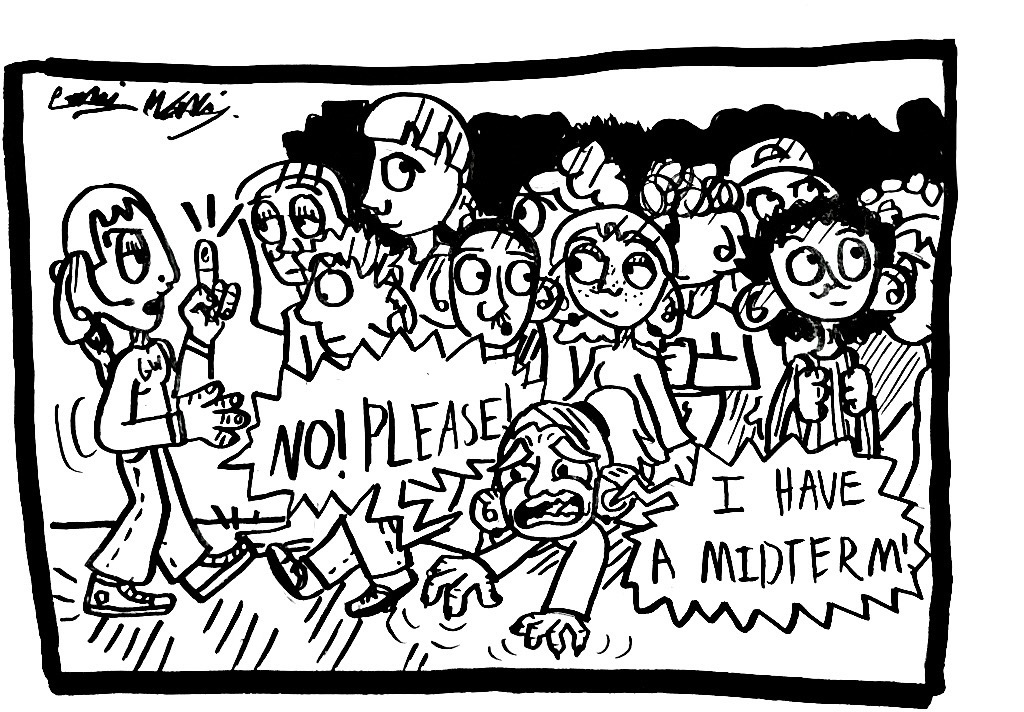Rachel Armany, a freshman majoring in journalism, is a Hatchet opinions writer.
Early memories have the power to shape who you are. Everyone has experienced specific things that have influenced how they act and think as an adult. Unfortunately, in my life, many of my formative moments centered around my struggles with body image.
For most of my life, I have been very aware of how others perceive the way I look. My tendency to analyze social interactions in several aspects of my life is sometimes helpful, but often forces me to be harder on myself and the way I look. Ever since I was in high school, whenever I’m around someone I don’t know well – perhaps at a job interview or a school orientation – I actively use body language to make myself appear thinner.

I’m not unique in disliking parts of myself. Most people have things they wish they could change about their appearance. But my size isn’t just something I’ve struggled with “liking.” From a young age, I have believed my weight and appearance were how I would be defined and would dictate how others treat me. I began to think that any weight I gained would just be more of a reason for people to dislike me and that any weight that I lost would account for my popularity.
I never thought less of anyone else who gained weight – it was a completely personal struggle. When it came to my body, I felt like I had to compensate: I had to be funny or smart or artsy to avoid being defined by my physical appearance.
I started to notice that my body didn’t look like my friends’ when I was in fourth grade. I remember sitting with my best friend and asking, “Do you think I’m fat?” Given our age and lack of any education or discussion on body image, she was startled by my question and immediately responded, “No, of course not.” But her response didn’t comfort me. I felt like she said those words out of pity. My friend didn’t mean any harm. In fact, she probably meant to make me feel better. But since then, I have been hyper aware of my body because I realized that the way I see myself isn’t the same as how others see me.
My confidence in my body and weight hasn’t always been dictated by the number on a scale or by the way I feel. But rather, hearing people talk about weight gain as a negative has affected how I feel about myself. One friend always used to tell me I’m on “the good side of plus-sized.” Although that might be an innocent enough statement, all it does is tell me that I’m overweight but not in an aesthetically displeasing way. The statement indirectly warns me of the “bad side of plus-sized” – the scary fate that is being overweight enough to claim the title of “the fat girl.”
Being on the “good side of plus-sized” comes with complications. My mom’s friends used to question her on what she let me eat because they feared I would “get fat.” In middle school, I felt like I had to prove to my friends that I was active and healthy. And even today, I worry over normal weight fluctuations – all to try and avoid people sharing their “concerns” with my size. Although those people might think they’re just looking out for me, they should not feel compelled to comment on my weight if I am not at risk for health problems.
Discussing body image is difficult, especially as a young girl, and even now as an adult. Talking about insecurities is always scary. But with body image, people are quick to tell you that things are just in your head if they aren’t expressing their concerns about you. Even today, hearing things like, “You’re not even fat” does little to help me. Hearing that confirms that if I were a bit heavier I should feel bad about myself and makes me even more fearful that people will judge me for gaining weight.
What I have found to be most helpful is when people allow me to speak openly about why I feel the way I do about my body and talk with me about accepting myself – not about changing it. For example, a positive conversation is one that encourages me to exercise because it makes me feel better, not because I should lose some extra weight. Those conversations are the ones that contribute to my self confidence, because I feel that my voice is being heard, even though the discussion may be more uncomfortable than a friend simply saying I’m not fat.
I understand that sometimes friends or family members may not always know how to respond to someone struggling with the way they look. Those closest to us love us the way we are and want us to accept ourselves, too. So I remain patient with the people in my life, but I am also honest with them. I try to let people know as often as I can when I feel like they are not taking an issue seriously or they are attempting to take the easy way out of an awkward encounter. Ultimately my problems are my own – it is up to me to work on them – but having these conversations with people who care about me helps.
Though my personal struggle with my weight is ongoing, I have made great strides in learning how to live with the body I have. I am beginning to listen to my body and understand how it works in order to develop a healthy lifestyle. I hope to stop overanalyzing and keep developing my confidence, instead of treating a number on a scale as the key to a better life.
Want to publish a personal essay? Submit your idea.


